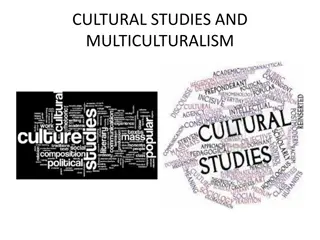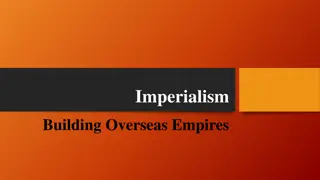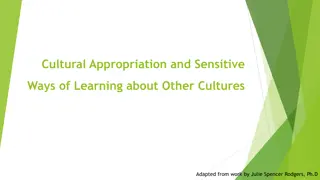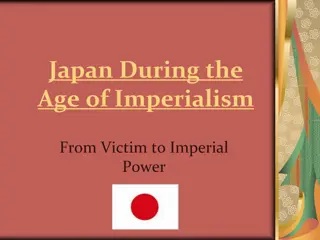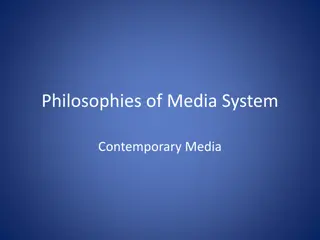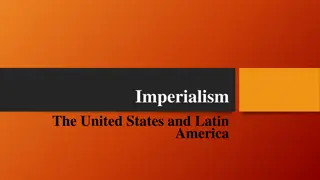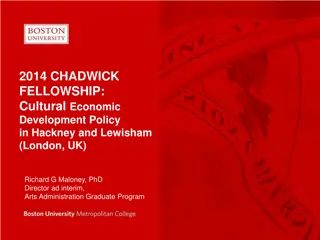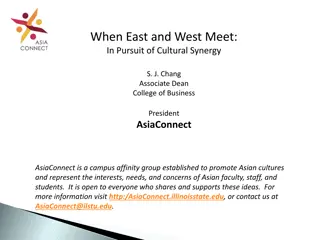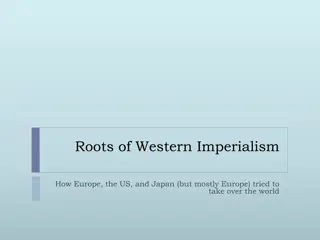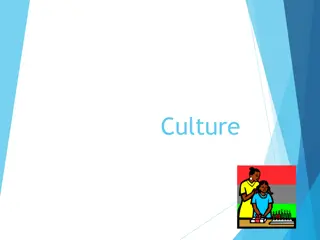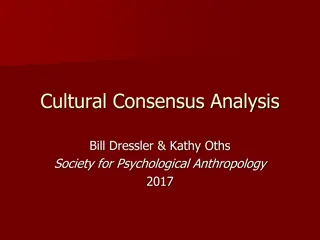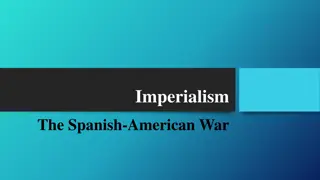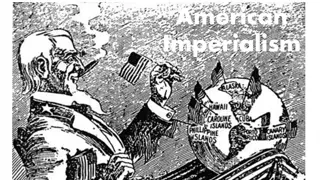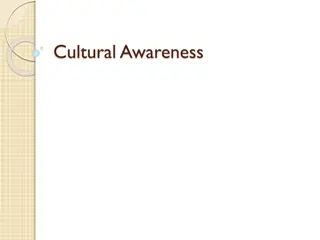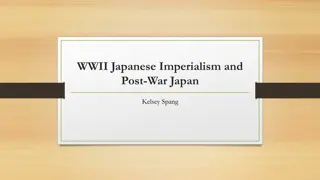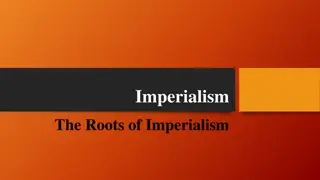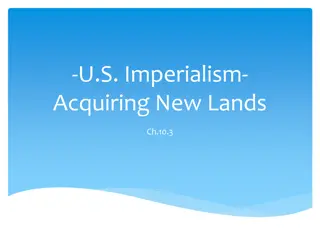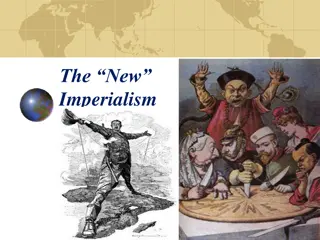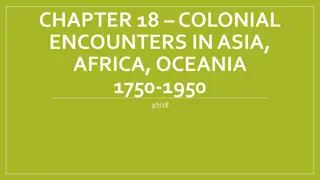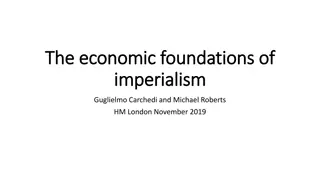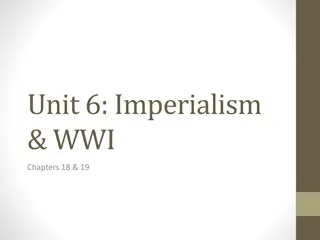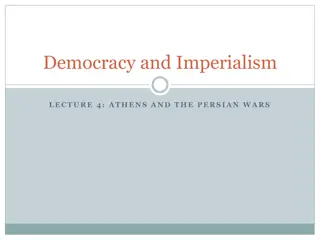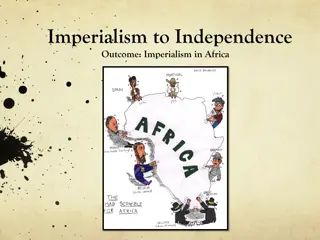Exploring Cultural Studies and Multiculturalism
Cultural studies is an interdisciplinary field that examines cultural differences while aiming to create a shared culture where diversity is respected. It challenges traditional views by studying all cultural productions and their societal contexts. Stuart Hall's work further delves into different p
0 views • 18 slides
Enhancing Short-Term Mission Effectiveness Through Cultural Anthropology Insights
Utilizing insights from cultural anthropology, this presentation delves into defining culture for short-term missions, viewing culture in successive levels, and key concepts such as cultural evolution and relativity. It explores the impact of culture on individuals and missions, emphasizing the impo
0 views • 16 slides
European Imperialism in the Late 19th Century
European nations in the late 1800s pursued imperialism to expand their empires for economic, political, and social reasons. Motives included economic interests, political and military ambitions, and the ideology of Social Darwinism. The Industrial Revolution fueled the need for resources and markets
1 views • 14 slides
Exploring Cultural Responsiveness Through Workshops & Practice Sessions
This content provides a comprehensive guide on cultural responsiveness through workshops and practice sessions. It covers topics like cultural sensitivity, biases identification, and ways to reduce implicit biases. Resources, videos, and insights on cultural knowledge and awareness are shared to pro
0 views • 19 slides
Critics and Defenders in Multiculturalism Debate
Critics of multiculturalism argue that its focus on cultural inequalities diverts attention from socio-economic issues, while defenders like Kymlicka advocate for balancing cultural recognition with equal rights. Feminist critics raise concerns about cultural support for individual self-respect, par
0 views • 9 slides
Understanding Socio-Cultural Factors of Abnormal Behavior in Psychology
Exploring the impact of socio-cultural factors on abnormal behavior, this article delves into the influence of societal pressures, cultural norms, and economic status on mental health. The socio-cultural model emphasizes how societal criteria shape perceptions of abnormality, highlighting the role o
0 views • 7 slides
Understanding Cultural Appropriation and Respectful Cultural Learning
This content delves into the concept of cultural appropriation, offering definitions, examples, and ways to avoid it. It emphasizes the importance of cultural appreciation and outlines the differences between appropriation and appreciation, highlighting the power dynamics involved. Readers gain insi
1 views • 16 slides
Enhancing Cultural Competency in Behavioral Health Professionals
This e-learning program, developed by the HHS Office of Minority Health, focuses on improving cultural competence for behavioral health providers. It covers topics such as the connection between culture and behavioral health, the impact of cultural identity on client interactions, and strategies to
0 views • 9 slides
Japan's Transformation During the Age of Imperialism
Japan's journey during the Age of Imperialism saw it transition from isolationism to becoming an imperial power. From strict order under the Tokugawa shoguns to the Meiji Era's rapid modernization, Japan adopted Western influences to reform and militarize. The Treaty of Kanagawa in 1854 marked the e
1 views • 20 slides
Examining State-Level and Dyadic Explanations for War in Global Politics
Understanding the reasons why certain states are more war-prone than others involves exploring factors such as economy, internal opposition, and political systems. Marxist explanations argue that capitalist economies are more prone to war due to issues like overproduction, wealth inequality, and imp
0 views • 17 slides
Understanding Media Imperialism and Cultural Influence
Explore the concepts of cultural imperialism, media imperialism, and theories of communication in contemporary media systems. Cultural imperialism involves the influence of powerful cultures on less dominant ones, impacting cultural identity. Media imperialism refers to the one-way flow of informati
0 views • 12 slides
Louisiana Cultural Districts: Engaging Communities in Cultural Development
The Louisiana Cultural Districts program, under the Cultural Economy Initiative, aims to revitalize local communities by creating hubs of cultural activity. By building on cultural resources and promoting art and culture, the program benefits from increased occupancy, commerce, and community identit
2 views • 18 slides
Understanding Colonialism and Imperialism in Modern History
The discussion revolves around the impact of colonialism and imperialism on international relations, focusing on the historical context, economic consequences, and nationalist movements against colonial powers. Highlighting key players such as Great Britain, France, and Germany during the 19th centu
2 views • 14 slides
Orientalism and Imaginative Imperialism in the Arabian Nights
This content discusses the intertwining of Orientalism, imperialism, and literature in works like "A Thousand and One Nights" (The Arabian Nights). It explores how intellectual and cultural energies influenced the imperialist perspective and translation of these texts, revealing deeper insights into
0 views • 8 slides
United States Imperialism in Latin America
United States' involvement in Latin America, particularly in Puerto Rico and Cuba, post-Spanish-American War, showcased a shift towards imperialism. Policies such as the Foraker Act and the Platt Amendment highlighted American efforts to exert influence in the region, leading to mixed reactions from
0 views • 25 slides
Cultural Economic Development Policy in Hackney and Lewisham: A Comparative Study
Building on previous research in Massachusetts, this project focuses on examining local government initiatives in cultural economic development in London boroughs of Lewisham and Hackney. The study explores the role of government in enhancing the cultural and creative industries, aiming to contribut
0 views • 7 slides
Bridging East and West: Cultivating Cultural Understanding
Exploring the complexities and nuances of cultural differences between the East and the West, this article delves into the challenges of cultural synergy and the importance of fostering multicultural understanding. Highlighting the need for effective communication and empathy across cultures, it pre
0 views • 18 slides
Unveiling the Roots of Western Imperialism: Europe's Quest for Global Domination
Exploring the origins and impacts of Western imperialism by examining how Europe, alongside the US and Japan, sought to exert control over various regions, particularly focusing on Africa. The process of colonization, the motivations behind imperialism, and the consequences for the colonized nations
0 views • 13 slides
Understanding Cultural Diversity in Healthcare
The content explores the significance of cultural diversity in healthcare, emphasizing the increasing diversity of the population in the United States and the importance of cultural competence in nursing. It delves into cultural concepts, transcultural nursing, cultural context of health and caring,
0 views • 13 slides
Reflections on Colonialism and Cultural Domination
The texts by Jean-Paul Sartre and Frantz Fanon provide deep insights into the dynamics of colonialism and cultural imperialism. Sartre discusses the manipulation of native elites by European powers, while Fanon delves into the psychological impacts on colonized individuals. Both authors highlight ho
1 views • 14 slides
American Imperialism in the Late 19th Century
Perception of manifest destiny, economic motives, and racial theories drove American expansionism in the 1890s, leading to overseas markets, acquisitions after the Spanish-American War, and debates over imperialism. Key figures, events, and ideologies shaped America's rise as a global power, includi
0 views • 13 slides
Understanding Cultural Consensus Analysis in Psychological Anthropology
Explore the essence of Cultural Consensus Analysis (CCA) as a significant aspect of psychological anthropology. Through ethnographic work and structured techniques, CCA helps verify shared knowledge within cultural domains and enhance the comprehension of cultural models. The model and steps involve
0 views • 64 slides
Unit Assessment Review: U.S. Imperialism History Lesson
Review session for upcoming history unit assessment on U.S. Imperialism. Topics covered include key events such as the Philippines under American control, reasons for Mark Twain's anti-Imperialist stance, factors driving American foreign policy towards imperialism, the case of Hawaii's Queen Liliuok
0 views • 15 slides
Causes of the Spanish-American War: Imperialism, Cuba, and Yellow Journalism
The Spanish-American War was fueled by imperialism, particularly the desire for colonies, as well as the unrest in Cuba against Spanish rule. American economic interests in Cuba, coupled with yellow journalism's sensationalized reporting, further escalated tensions leading to the conflict.
0 views • 25 slides
Exploration of American Imperialism Through Historical Events
American imperialism, characterized by extending control over weaker regions for economic and political gain, is exemplified through events like Hawaii's annexation and China's Open Door Policy. The impacts of imperialism on native populations, such as Hawaiians and the Chinese, raise questions abou
0 views • 13 slides
Democracy and Imperialism: Origins and Legacy of Classical Athens
The module explores the origins, nature, and legacy of democracy in Classical Athens (508-322 BC), shedding light on the political structures, principles, and impact of Athenian democracy. Topics range from the supreme authority of the Assembly to the accountability of magistrates, providing insight
0 views • 16 slides
Understanding Cultural Awareness and Diversity in the United States
Explore the significance of cultural awareness, including definitions of culture, cultural groups, and subcultures. Learn about the diversity in the United States based on national origins, beliefs, customs, and shared characteristics. Discover how to interact positively with individuals from differ
0 views • 37 slides
American Imperialism in the Late 19th Century
The late 1880s and 1890s saw the United States embroiled in near-wars and diplomatic crises due to American expansionism. This included the annexation of Hawaii despite Queen Liliuokalani's opposition, and the debate over acquiring the Philippines for economic interests. Anti-imperialists argued aga
0 views • 5 slides
WWII Japanese Imperialism and Post-War Japan
Explore the historical narrative of WWII Japanese imperialism, the factors leading to Japanese control of Pan-Asia, interference from the West, rational for Pearl Harbor, and the aftermath including the fall of Japan and the devastating effects of the atomic bombs on Hiroshima and Nagasaki.
0 views • 17 slides
Development and Application of Cultural Policy Typology for Arts and Culture
This research focuses on presenting a cultural policy typology based on goal variation and examining its application in a U.S. state art/cultural agency, specifically the Massachusetts Cultural Council. The study delves into the policy goals of the council and highlights the need for a specialized c
0 views • 16 slides
Exploring Cultural Policy in the Mediterranean with a Focus on Malta
Delve into the intricate web of cultural relations in the Mediterranean region, centered around Malta. From historical and political insights to postcolonial influences and the role of cultural policy, this exploration sheds light on the complexities and nuances shaping the cultural landscape. Disco
0 views • 23 slides
Understanding the Roots and Causes of Imperialism
The roots of imperialism trace back to the late 19th century when the U.S. transitioned to a major global player, acquiring territories and expanding influence beyond its borders. Economic benefits, such as access to raw materials and gaining a competitive edge, drove nations towards imperialism. Th
0 views • 16 slides
Chinese Nationalist Revolution: Prelude to Internal Tensions and Imperialism Redux
Prelude to the Chinese Nationalist Revolution explores the backdrop of internal tensions and Imperialism in China from 1895 to the early 1900s. The period witnessed a series of revolts against Manchu authority, including the Taiping Rebellion and self-strengthening efforts to adopt Western technolog
0 views • 30 slides
U.S. Imperialism: Acquiring New Lands and Foreign Influence
Explore the impact of U.S. imperialism through the acquisition of territories such as Puerto Rico and Cuba following the Spanish-American War. Discover the control exerted by the U.S. over these regions and how it influenced local governance. Delve into U.S. economic interests in Cuba and foreign in
0 views • 9 slides
The New Imperialism - Historical Overview of European Colonization
Explore the era of the New Imperialism through descriptions of North Africa, Egypt, Belgian Congo, and American missionary accounts. Learn about the impact of imperialism on various territories and the atrocities committed in the pursuit of resources and control.
0 views • 27 slides
Global Interactions and Imperialism in the 18th and 19th Centuries
This content covers colonial encounters in Asia, Africa, and Oceania from 1750 to 1950, focusing on the impact of European imperialism. It delves into the economic, political, and social dynamics of this period, highlighting factors such as linguistic separation, social Darwinism, and the consequenc
0 views • 11 slides
Economic Foundations of Imperialism: Exploitation and Value Transfer
Imperialism primarily functions as an economic mechanism for exploiting value rather than seeking political dominance. The transfer of value occurs through mechanisms like unequal exchange, global value chain flows, and capital flows, leading to the long-term appropriation of value by imperialist na
0 views • 28 slides
United States Foreign Policy Evolution from Imperialism to World War I
Explore the United States' foreign policy evolution from Imperialism to World War I, including the Open Door Policy, Dollar Diplomacy, and involvement in the Spanish-American War. Learn about the military actions in acquiring territories such as Puerto Rico, Guam, Philippines, and Hawaii. Delve into
0 views • 8 slides
The Impact of Athens and the Persian Wars on Democracy and Imperialism
The lecture delves into the historical events surrounding Athens and the Persian Wars, highlighting key milestones such as the expulsion of Hippias with Spartan help, Cleisthenes' reforms, and the rise of Archaic Greek imperialism in Athens and Sparta. Herodotus' perspective on the Persian Wars and
0 views • 21 slides
The Age of Imperialism in Africa: From Imperialism to Independence
The Age of Imperialism in Africa delves into the historical background of European domination, exploring factors such as European motives, societal impact, and the spread of Social Darwinism. It covers the transition from African trade in the 15th to 17th centuries to the eventual independence movem
0 views • 18 slides
